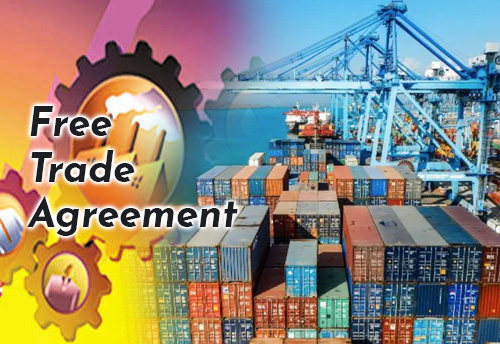Staying out of emerging large FTAs is not a wise decision: FISME
Updated: Dec 30, 2019 11:24:54am

Staying out of emerging large FTAs is not a wise decision: FISME
New Delhi, Dec 30 (KNN) Staying out of emerging later Free Trade Agreements (FTAs), for example RCEP, is not a wise decision for India, the Federation of Indian Micro and Small & Medium Enterprises (FISME) country’s largest MSME body, said in its pre-budget memorandum.
FISME submitted its views and suggestions to the Union Finance Minister Nirmala Sitharaman in a meeting held recently.
On India’s participation in FTAs and PTAs, FISME suggested that while Multilateral trade Agreements are ideal, the movement there is all but dead.
Free Trade Agreement is a deal or an agreement between two or more countries or a trading bloc that taxes, regulatory laws, quotas and preferences on goods and services to be traded between them will be reduced or eliminated to foster better trading relations and returns.
FTAs may also include clauses with respect to intellectual property rights (IPRs), investments, government procurement, etc.
“Staying out of emerging large FTAs-e.g. Regional Comprehensive Economic Partnership (RCEP), is not a wise decision. India’s integration with World trade is deep now and we need to leverage FTAs to benefit from participation in GVCs. If we don’t leverage them right, we shall end up importing almost everything and that too at higher cost.”
India walked out of the China-backed mega trade deal RCEP in November 4, after the negotiations failed to address New Delhi’s “outstanding issues and concerns”.
Commerce & Industry Minister Piyush Goyal recently said that India will have to prepare itself for a rules-based multilateral trading system and for that, it will have to look at ways which are WTO-compliant, support industry from the base and then stand on its own feet.
While being open to FTAs, FISME in its memorandum stressed that there has to be parity between ‘external liberalization’ through FTAs and ‘internal reforms’.
“Without the latter, whether being held because of lack of understanding or lack of political will, FTAs could be disastrous,” it said.
Suggesting measures to help country’s micro, small and medium enterprises (MSME) sector. FISME said industrial inputs such as steel, copper, aluminium, polymer/plastic raw materials should attract lower duties and should be part of early harvest during period of implementation.
The MSME/SSI tariff lines should be back loaded and should attract higher duties, it suggested.
An agenda of corresponding internal liberalization needs to be discussed, agreed upon and implemented in a time bound manner as FTAs are implemented, suggested the industry body.
Emphasizing on measures for promotion of exports, FISME noted that Merchandize Exports is directly linked to being competitive in manufacturing–quality and price matrix.
The role of Government’s business entities has critical bearing on manufacturing and export capabilities. Exporters also need active support of public institutions in surmounting the non-tariff walls especially of Standards and Testings.
FISME suggested that the role of export support institutions/ EPCs/ Exim Bank needs to be thoroughly reviewed in consultation with the beneficiary group to really help exporters in changed economic realities.
As half of exports are from MSMEs, at least 50% of market development funds should be ear marked for MSMEs, stressed FISME.
It called for strict monitoring of delay in GST refund to exporters through “live dashboards”.
The apex body for MSME associations also called for PSUs to be mandated to gear up for exports and develop their supply base/ancillaries comprising of MSMEs in India by building their capabilities.
It would have a benign impact both on domestic and exports front, FISME said.
It must be noted that the share of exports of products related to India’s MSME during the year 2018-19 stood at 48.10 per cent. (KNN Bureau)












